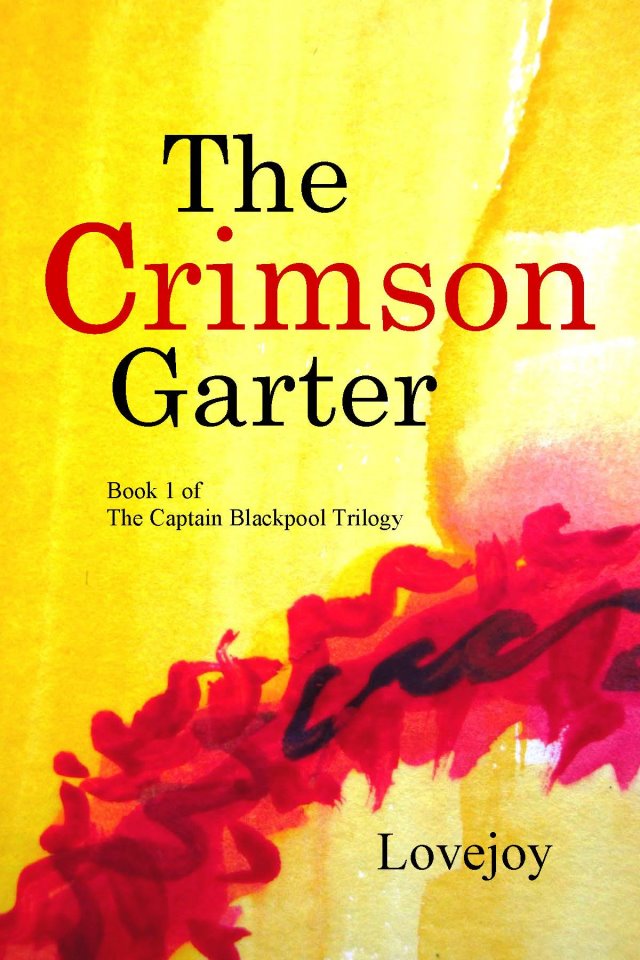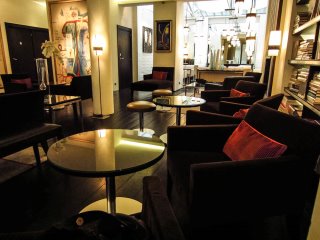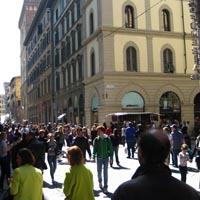
Vittorio Rosetti has vowed to put things right, on learning his sister has taken flight. Sir Robert Marsh has been unsuccessful in getting police cooperation to search for the whereabouts of his wife, who has left him a mysterious letter. So what really happened in those last two hours to Grazia? Lucire travel editor Stanley Moss, writing pseudonymously as Lovejoy, explains in Chapter 11 of The Crimson Garter
Chapter 11
Two hours earlier
Robert Marsh hurried off to the auction, so Grazia immediately began her ablutions. The long journey had left her exhausted, but she understood she had little time in London, and she knew that she must make the most of it. A quick bath of cool water on her face and hands, and she composed herself. Perhaps it might be a good idea to follow Robert’s advice and have her tea first at the Cringley Arms before venturing out. At the very least it would give her sustenance for the day to come. She calculated that she had seven good hours before he returned, and she intended to fill every moment with activities to elevate her mood and nurture her soul.
She hurried down the stairs into the low-ceilinged coffee room, nearly falling over Simon, who sat collapsed at a table, head down on his arms, apparently asleep. After he did not respond to her polite cough she located a rusty bell on a rickety shelf by the door, which she rang. Simon snapped his head up, blinking wildly.
‘My lady requires …?’
‘If there is tea …’
‘I will return in a moment!’ He pointed to the wooden bench at the rough table where he had been napping, and attempted to brush some crumbs off the table with his forearm, then shuffled off for the kitchen, still half-dazed. Grazia sat gingerly down, accepting the warmth of the room, where a small fire burned cheerily. She reflected on the puny amount of coal Robert had purchased, and how little time it would last.
Simon’s reappearance heralded a greasy, chipped teapot and cup, set before her with much ceremony. He darted out of the room a second time, only to return moments later with a battered tray on which rested a mismatched saucer, warped silver teaspoon and a sugar bowl bereft of a top, which had at one time possessed both of its handles. He produced from his vest pocket an ancient strainer, in the centre of which a gaping hole yawned in the mesh. This he placed across the top of the cup, and tongue wedged in the corner of his mouth, breathing through his nose, he served a thin, amber liquid. A faint smell of vinegar rose up from the teapot, and tiny globules of some mysterious substance shimmered on the surface.
‘One lump?’ he inquired enthusiastically, holding up the broken sugar bowl. Grazia shook her head, ‘No.’
‘Have you any cream?’ she asked politely.
‘Cream! Cream!’ Simon replied in confusion. ‘Don’t believe so. Cream! But I shall endeavour to find out.’ He bounded out of the room in an ungainly fashion, leaving Grazia alone in the deserted room. La Fragolina reconsidered the setting with its dark corners and rough wood furniture, the speckling of crumbs on the floor, the thick, stale air infused with ancient grease and dust. She looked down at the poor offering he called tea. Certainly warm, but with the sour aroma and the floating grease it did not augur well. Simon had disappeared. She waited, hypnotized by the steaming cup, until the thought occurred to her that he might be gone a while, no doubt scurrying down the back alley to some milk-seller’s and sloshing whatever he found back to her in who knew what kind of vessel. Without further ado she stood up, and walked in a wilful and sensible way out of the hotel, into the small street, and rounded the nearest corner. More rain, and more chill, she observed.
She had not walked but a short distance when she came upon a fine dark horse with a white star upon his forehead, hitched to the front of a well-maintained hackney cab, at that moment engaged in a meagre meal of oats, crunching away happily in its nosebag. She reached up to touch the animal.
The driver took notice, tipped his hat, and said, ‘Up a bit early aren’t we today?’ And mumbled under his breath, ‘Too damn early if you ask me, which nobody did.’
Horses and dancers, Grazia thought. We both get up early and do a hard day’s work, physical labour for little wage. I have often heard it said that horses are graceful as dancers. She thought: the grace and strength of their fine legs and the dancing rhythms of their gait. Signor Cavallo, I understand your life.
‘His name is Romeo,’ the driver offered. ‘I warn you, he is a great judge of character, he knows just what people want. People will often tell him, without his asking,’ and added, ‘While few will tell me, as if I really cared to hear in the first place.’
Here is what I want, Grazia thought: I should sincerely like to be done with this errand to the apothecary for Lady Dorothea. And quickly find my own diversions, which the horse named Romeo no doubt already knows. ‘I am not of this city,’ she informed the driver, and inquired about the fare he might charge to convey her to the laudanum merchant. Her destination startled the driver.
‘Very clever to avoid such a long walk, especially in this downpour. Has nobody mentioned to you the dangerous districts one needs to pass through?’ He leaned over in the seat and straightened his tall hat. ‘I am always ready to take on a few more stops. That is, if you had more places to go, we would wait for you, if you get my meaning. I could have you back to your lodgings safe and sound at the end of your errands. And dry as well.’ On cue the horse shook his head in assent and stared at her with one large brown eye. ‘Probably get your throat cut if’n I didn’t watch out for you,’ he muttered.
Grazia Rosetti did not hesitate to strike a deal with the man. She quickly engaged his services for half the day, thankful to be out of the cold.
‘I notice by your accent,’ the driver immediately said, clicking the reins, ‘that you come from far away. Here you surely need protection from the hostile elements.’ And then to nobody in particular, ‘Not to mention from cutpurses, rogues and plague-carrying sons of bitches.’
Behind her, Blackpool feigned innocent scrutiny of a store window, and overheard every word of the exchange. He quickly found a hackney of his own, and drawing upon his encyclopædic knowledge of the London back streets, in a most secretive manner, directed the driver to a point only a short block from the apothecary. Later, when La Fragolina alighted, Blackpool was already there, close enough to eavesdrop again, leaning around the corner in a nondescript way.
The apothecary had been there for years, in fact Robert had learned of it from his father. Inside, strange and unfamiliar smells abounded, companions to endless shelves lined with large ceramic urns and rows of glass-doored cabinets where resided uncountable mysterious potions and powders and salts. It surprised Grazia how quickly she completed her transaction, since the elderly clerk should have doddered through the sale. Instead, he was the picture of efficiency, taking her money without a word, hardly looking at her. She headed for the door, carefully placing the paper-wrapped bottle she had bought into her handbag as she walked. Out of the corner of her eye she spied someone at the end of an aisle. It took her a moment to realize it was not a real person she noticed, but a reflection in a looking glass and it shocked her. For she had caught sight of a pale and haggard soul with dark circles under her eyes, pinched cheeks, a woman years older than herself. The woman appeared to be a widow because her face was framed by a dark silk bonnet, and she was clad in sombre cloth and clutched about her a black wool cloak. In the mirror Grazia saw a personage tired, defeated and unfulfilled. It shocked her to realize that it was herself after all whom she had observed there. It gave her a shortness of breath, her heartbeat grew faster, and she moved to open the door to escape the stifling atmosphere, to breathe fresh air once again. Outdoors she found it strangely refreshing, for the light had changed and the temperature invigorated her. A resolute look fell over her features and she thought: I have not eaten today. ‘Next, I should like some tea,’ she told the driver simply, climbing back into the cab. Obediently he tipped his hat.
‘To the Dorset, Romeo!’ And then to Grazia: ‘You will be quite content with what they offer, and it is not far, not far at all.’ And to himself: ‘And the footman will no doubt try and extract a few pennies from me to wait at the curb, as he has before, the yellow bastard.’
Scant minutes later the cab pulled up to the genteel façade of the Dorset Hotel. Before the cabby could fix the brake and jump to the curb a liveried groom stepped forward, opened the carriage door regally, offered his hand to Grazia, and escorted her up the stairs, where she entered the elegant premises without a delay. This was no mysterious ritual, for she had made many an entrance at glamorous hotels in Paris, and she instinctively knew what to do, uninhibited by her drab attire. A doorman bowed deeply, a deskman nodded, and two gentlemen stepped aside politely, somewhat puzzled at the simplicity and elegance she projected. As she traversed a mirrored hallway another liveried groom discreetly offered to take her wrap, passed her a powder blue ticket and he carefully folded the cloak over his impeccable sleeve. He bowed, motioning her to the tea salon.
Not for an eternity had Grazia’s feet danced across such soft carpeting, had her eyes rested on a sight so soothing as the beautifully adorned walls, or heard a sound so restful as the murmuring civility of this place. She followed yet another groom to a perfect marble-topped table, which immediately was set with white tablecloth edged with lace, embroidered napkin, silver service, among which she found a beautifully lettered menu card. She ordered, then presided from the luxurious softness of the gilt and plush chair, soothed by the room, with its fine aromas and pleasant colours. Her toes squirmed happily in her boots and the blood returned to her face. Fragrant smells drifting through the room awakened her senses. How quickly the maid arrived back, and poured from a silver pot of tea, placing in front of Grazia a carousel of fruit-studded scones, clotted cream, tiny sandwiches filled with smoked salmon and cucumber. A delicate porcelain bowl of deliriously deep-coloured strawberries, and raspberry and black currant jams accompanied a delicate silver pot filled to overflowing with sparkling lumps of sugar. What contrast to the frugal kitchen of Marshmoor, or the horror of the Cringley Arms, she thought! Such a repast as this was once the norm, but how long had it been since she had feasted so magnificently, each of her senses satisfied to such a degree?
It was at that moment Grazia noted some periodicals on an unoccupied seat next to her. A copy of Treadwell’s Continental Gazetteer stared at her from the top of the pile. Grazia wondered how appropriate it was to grab for them, but as no one appeared to be looking in her direction she simply extended her arm towards the adjacent chair, which was an easy reach away, and seized in hand the papers. She wasted no time in commencing with Treadwell’s, and she consumed the front page voraciously, headline by headline. For the first time in months she began to reacquaint herself with journalistic accounts of the world of the arts. Much reporting contained salacious gossip about Madame C.’s notorious salon. Little had changed but the names, thought Grazia. She poured over the list of performances scheduled at the Paris Opéra, noting that Tatiana Stregova had adopted several ballets which had been her own signatures, among them The Gypsy’s Daughter, and Persephone.
Just outside the door of the salon, situated behind a potted palm, Captain Harry Blackpool observed La Fragolina’s activity with immense satisfaction. It gave him a peculiar joy to follow the gusto with which she now consumed the repast before her. His was not a world where one often encountered such innocence and abandon. Each bite returned more blush to her cheeks, enlivened her eyes, and a quickness and agility in her movements amplified as she reached for a taste of the sandwich, then spread clotted cream on her scone, heaped jam on top of that, leaping to crescendo when it nearly dripped onto her lap, forcing her to take a sudden and enormous bite like a shark on the attack. Now a perceptible moustache of clotted cream adorned her upper lip. It took a few sips of tea before she realized the necessity of a quick dab of the napkin. Blackpool leaned back, infinitely grateful. He had more often known endless hours positioned in a damp doorway laying in wait for the most reprehensible characters. She would clearly indulge herself for a while in a place like this. He made himself invisible, sipped his tea amiably and waited.
Concurrent with each ravenous bite Grazia’s eyes darted over the pages, her curiosity further stoked, reading line after line with incredible eagerness. She devoured the food, then she devoured the text, as she devoured the text she devoured the advertising, and nothing which was before her at that moment passed unseen. With growing admiration Blackpool parted the palm leaves and watched her intently, as she perused the magazine from cover to cover, until she suddenly stopped short on the last inside page. Her eyes riveted on something which Blackpool could not see, but clearly it rendered her dumbstruck. She looked hard at the page, then away, then hard at the page again, so startled was she by the headlined article by M. Severin, a noted critic of the dance with whom she had been well acquainted before she left Paris.
Related articles hand-picked by our editors
 Two Parisian hideaways
Two Parisian hideaways
Stanley Moss looks at two distinctive Parisian hotels on opposite sides of town, with very different characters
photographs by Paula Sweet and courtesy Hôtel Le A
 Lucire’s
summer luxury travel special
Lucire’s
summer luxury travel special
There’s luxury—and then there’s luxury. Travel editor Stanley Moss has Lucire’s most comprehensive luxury
travel guide, with our picks in three locations:
• Skirting the upper atmosphere
in Firenze
• Undiscovered Rajasthan destinations
• Four small Paris hotels
photographed by the author
 Summer in London
Summer in London
Stanley Moss packs in a lot on his London walkabout, from Asian
food to Guy Bourdin
Advertisement
Copyright ©1997–2022 by JY&A Media, part of Jack Yan & Associates. All rights reserved. JY&A terms and conditions and privacy policy apply to viewing this site. All prices in US dollars except where indicated. Contact us here.